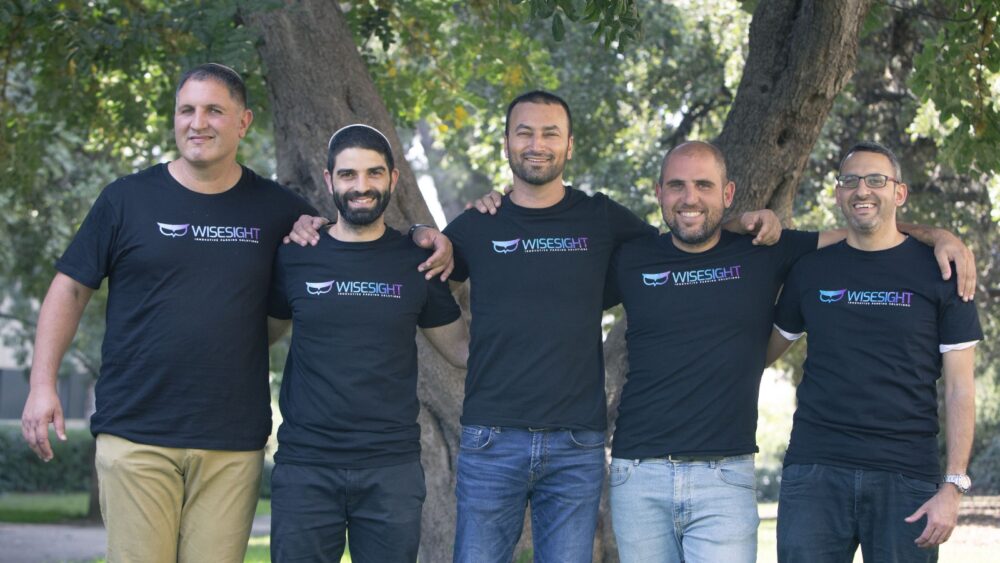Parking on city streets can be a nightmare. According to the latest statistics, driving around and around in search of a spot takes an average of 26 minutes and accounts for one-third of urban traffic congestion.
And when you finally find that parking space, if you neglect to activate your payment app you can be slapped with a hefty fine.
Jerusalem based startup Wisesight was created to ease those parking pain points and many more.
Leveraging the power of big data, the Internet of Things and artificial intelligence, this multipurpose solution benefits both motorists and municipalities.

Wisesight CEO Akiva Armon tells ISRAEL21c that the idea took root as he watched a driver circling his sister-in-law’s narrow block in Tel Aviv in search of parking.
From his vantage point at a window above the street, Armon saw a spot available at the next corner. If only he could have conveyed that information.
He wasn’t the first to think of this. Indeed, there are apps that direct motorists to vacant parking spaces using the wisdom of the crowd. And there are apps that handle parking payment.
Wisesight bundled those services, and a whole lot more, into its app-free solution for a frictionless park-and-pay experience.
“We’re the Israeli lunatics who tried to figure out how to do it all,” jokes Armon.
Wisesight has raised $7.5 million and operates in eight Israeli cities so far. Pilot projects have begun in the Jerusalem, Pittsburgh and Dubai municipalities, and at major carparks in Los Angeles International Airport, Hoover Dam, London and Ukraine.
Everything’s automated
Working cooperatively with the client municipality or carpark operator, Wisesight uses connected sensors and live video feed to map the vehicles parked on the street and in lots.
The captured data can be used to analyze traffic and parking patterns, guide motorists to vacant spots, categorize parking spots (for example hourly, daily, subscription, disabled), monitor reserved spots, and enhance security due to the video component.
Parking lot operators can keep track of occupied and vacant spaces and set differential prices to incentivize distribution of vehicles more evenly. Wisesight could, in the future, even help car owners find their parked car with the help of GPS and real-time video.
For now, payment is the main use case. Studies show that half the time people step away from their cars without activating their parking apps, whether willfully or accidentally. This translates to a lot of parking fines and a lot of lost revenue.
Wisesight is embedded in the payment apps used in its partner cities (in Israel, that’s Pango and Cellopark) and can send the vehicle owner a text message reminder, generate an invoice, or alert city parking inspectors if necessary.
Establishing a US subsidiary
“In the US we’re working with four of the six biggest parking industry integrators,” says Armon, an electrooptical engineer formerly involved in developing military projects including the Arrow 3 antiballistic missile system.
He and four other engineers from a similar defense-industry background – Reem Rokach, Itai Kadosh, Eliran Cohen and Erez Rokach — brought their accumulated knowledge to Wisesight.

“We wanted to have a positive influence on as many people as we can. That’s why we came to the parking sector. It affects so many people every day, multiple times a day,” says Armon.
“With our IoT system to manage and monitor parking spaces fully automatically, our vision is to get rid of parking fines and enable frictionless payment.”
Municipalities that have integrated Wisesight technology into their smart-cities services reap benefits including higher revenues and less traffic caused by people trying to park their cars, Armon notes.
“And drivers are happier because no one is trying to screw them with parking fines and confusing parking regulations,” he says.
The startup has 20 employees and is establishing a US subsidiary, Wisesight USA, in Phoenix.
For more information, click here
Abigail Klein Leichman is a writer and associate editor at ISRAEL21c. Prior to moving to Israel in 2007, she was a specialty writer and copy editor at a major daily newspaper in New Jersey and has freelanced for a variety of newspapers and periodicals since 1984.
First published on:Israel21c
The copyright belongs to Israel21c and the author.


